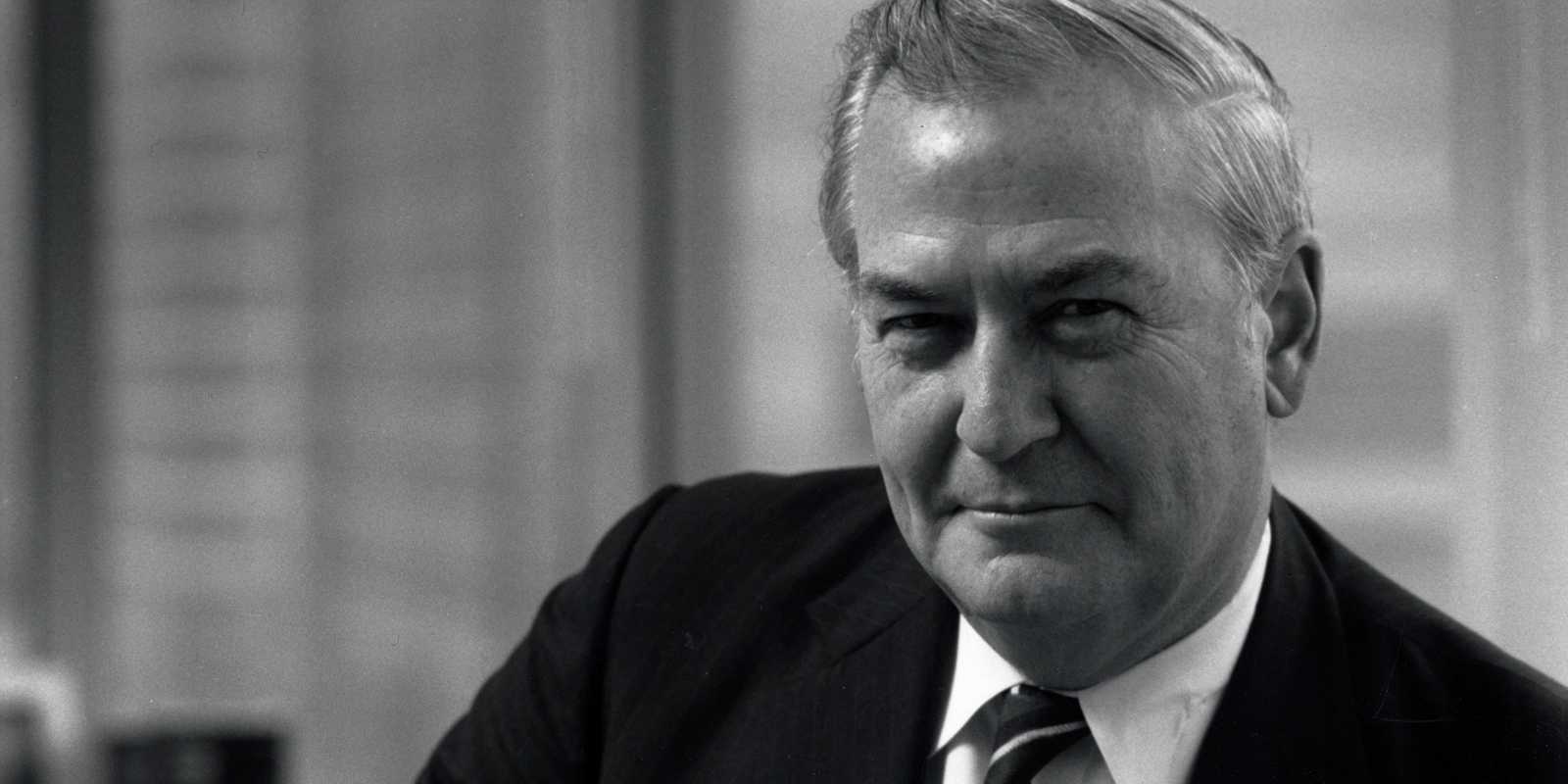
ONE Connection | 10 Fascinating Facts About Dick Pogue
10 Fascinating Facts About Dick Pogue, Jones Day's Fifth Managing Partner
Read the full issue of ONE Connection.
At a May 18, 2023, celebration and roast of Richard ("Dick") Pogue, a who's who of past and present Firm lawyers, politicians, community leaders, friends, and family joined together at Cleveland's Playhouse Square to honor Jones Day's fifth Managing Partner and his oversize impact at the Firm and in the community. Through humorous barbs, heartfelt tributes, photos, and even home movies, the evening's presenters painted a portrait of a man with an impeccable work ethic, a passion for philanthropic and civic projects and a questionable golf swing. (As one retired partner described it, "It is like an octopus having a seizure.")
A 1950 graduate of Cornell University, Dick received his law degree from the University of Michigan Law School in 1953 and served three years in the U.S. Army's Patents Division, leaving with the rank of Captain. He joined Jones Day as an associate in 1957 and became partner in 1961. In 1984, then-Managing Partner Allen Holmes, who was battling Guillain-Barr syndrome, a rare autoimmune disease, selected Dick as his successor a position he held through 1992. During his nearly nine years as Managing Partner, Dick oversaw the Firm's explosive growth, nationally and internationally.
Dick can be found most days in his North Point office in Cleveland as senior advisor to the Firm. He and his wife of 68 years, Patricia Pogue, who passed away earlier this year of complications from Parkinson's Disease, have three children Mark, Tracy, and David.
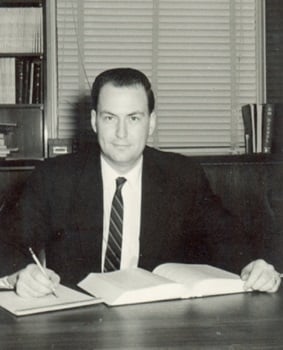
Dick Pogue in his office at Jones, Day, Cockley & Reavis in 1961, the year he became a partner.
1. Under Dick Pogue, Jones Day became an international law firm.
Allen Holmes was known for growing Jones Day into a "Truly National Firm" with offices across the United States. Dick envisioned Jones Day as an international law firm, One Firm Worldwide, representing clients across the globe. In 1986, he turned that dream into reality by negotiating the Firm's merger with Surrey & Morse. As he recalls:
"I could see that international was coming strong and that we ought to try to be in there early, and so I decided to make that an effort of the Firm. I asked [retired partners] Dave Clossey and Dennis LaBarre to study how we could get there. They did their research for about a year, and they came back and said, 'You can't get there from Cleveland. The clients won't take you seriously. Unless you have a New York office, forget it.'
"I spent a summer trying to acquire a New York firm, and I had a series of meetings with middle-sized firms that we thought would be somewhat similar to ours. We'd have these wonderful conversations, and then we'd get to governance and I would say, 'Of course, our governance managing partner system is going to prevail' and that would end the conversation."
Finally, he found an opportunity for the Firm to merge with Surrey & Morse, a law firm with offices in Washington, New York, London, Paris, and Riyadh, Saudi Arabia.
Overall, the Firm grew greatly during Dick's tenure, domestically and internationally, from approximately 335 lawyers in five offices in 1984 to 1,250 lawyers and 20 offices in 10 countries in 1992, his final year as Managing Partner. He was succeeded as Managing Partner by Pat McCartan in 1993.
2. He prioritized Firm diversity.
Dissatisfied with the Firm's track record on hiring and retaining Black, Hispanic, and female lawyers, Dick created a minority hiring task force in 1987, which visited each U.S. Firm office, met with their recruiting committees, and suggested strategies for seeking out minority lawyers. The efforts paid off: Within two years, the number of recruiting visits by Black law students increased dramatically.
He also opened the door for women partners. In the 1960s, Dick worked to persuade then-Managing Partner Jack Reavis to admit Naoma Stewart as Jones Day's first female lawyer. Later, Dick persuaded him to elevate Naoma to partner the first female partner in Firm history, and possibly the first female partner at any major Cleveland law firm.
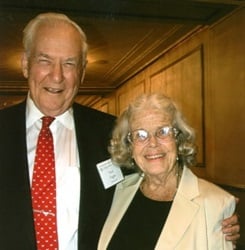
With retired partner Naoma Stewart in 2006.
3. His father, Welch Pogue, was Managing Partner of the Washington Office.
Dick Pogue was already well established as a partner at the Cleveland Office when, in 1967, the Washington Office merged with Pogue & Neal, a Washington, D.C., law firm founded by his father, L. Welch Pogue. ("We had a strong anti-nepotism policy but it banned the hiring of sons of partners, not fathers of partners," Dick noted.) The senior Pogue an authority in aviation law who helped define the regulatory framework for commercial air travel after WWII served as Managing Partner of the Washington Office from 1967 to 1979. To reflect the merger, the Firm eventually changed its name from Jones, Day, Cockley & Reavis to Jones, Day, Reavis & Pogue.
4. He's "Mr. Cleveland."
In 1988, Cleveland Magazine named Dick "the most powerful man in the city" playing a role in many of the most meaningful civic accomplishments in Cleveland's history. He has been a fixture in corporate, civic, and nonprofit boardrooms for the better part of six decades and, while he has significantly pared back his schedule, he continues to serve on the boards of nonprofit, including philanthropic, organizations.
He also helped the city recover from some very dark times. In 1978, Cleveland's young mayor, Dennis Kucinich, led the city to default on its bank loans becoming the first major American city to default on its municipal obligations. Dick was chief among those who stepped in and helped orchestrate a remarkable comeback one that involved bringing in a business-friendly candidate for mayor (George Voinovich, who not only won the election but later became Ohio's governor); and mobilizing business leaders to take an active role in the city's turnaround. In 1982, Cleveland Tomorrow debuted, with CEOs from 50 of the region's largest companies. They "loaned" their executives to places like City Hall and other government offices, and made good on their pledge to clean up and invest in the city.
Dick also helped give voice to the minority community as a founder and chairman of the Greater Cleveland Roundtable, an urban coalition comprised of leaders from business, education, labor, civic, and religious organizations to facilitate minority economic inclusion and improve multicultural and multiracial relations in the city. "We didn't have much clout or much money," said Dick, "but we had voices."
5. He played an instrumental role in bringing the Rock & Roll Hall of Fame to Cleveland.
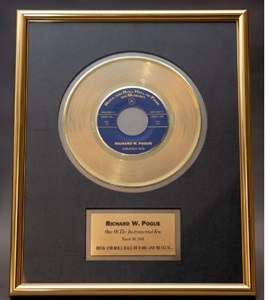
Dick received a gold record in recognition of his many contributions to the Rock & Roll Hall of Fame.
On September 1, 1995, more than 100,000 supporters attended the Rock Hall's dedication and opening ceremonies in Cleveland. Dick, a founding trustee, represented Jones Day at the ribbon-cutting ceremony. He was joined by state and local officials and rock luminaries, including Chuck Berry, Little Richard, and Pete Townshend. The day marked the culmination of more than a decade of planning, discussing, negotiating, and building a permanent home for the rock hall and Dick was central to all of it, including working out some critical location details with architect I.M. Pei. While Dick admits he didn't know much about rock & roll, he knew that the Rock Hall could provide an economic boost to Cleveland.
"We needed something special, something unique, something the world would recognize Cleveland for," Dick says. (To learn more about his role in bringing the Rock Hall to Cleveland, read the ONE Connection article, "Rock & Roll Power Play.")
6. He wanted to be a sportswriter.
Dick was sports editor for Cornell's student newspaper his junior year and managing editor his senior year. He had a talent for writing and thought he might pursue a career in sports journalism. "There was a brilliant sportswriter for The New York Times, and I wanted to be his successor, but I wasn't quite ready," Dick recalled. "I thought, well, I'll go to law school as a holding action, and that'll give me three years to think about what to do. I really went to law school not to be a lawyer, but to give myself time to decide on what career I would take."
(Incidentally, his son David Pogue did pursue journalism. He is an author, former New York Times columnist, and six-time Emmy-winning CBS Sunday Morning news correspondent.)
7. His work on a book about antitrust law brought him to the attention of Allen Holmes and Jones Day.
While he was at the Pentagon working in the Patents office, Dick worked nights and weekends to help a law school professor write a book on antitrust law. Allen Holmes, a fellow Michigan Law School alumnus, learned about Dick's work and visited him several times in Washington. Eventually, Holmes persuaded Dick to join Jones Day. "Allen was very persuasive and did not like to take 'no' for an answer." Both men would become national experts on antitrust law and, at different times, Chairman of the ABA Antitrust Section.
8. His college roommate was the son of Jack Reavis, Jones Day's third Managing Partner.
Dick's decision to work at Jones Day probably had little to do with this coincidence. But it probably didn't hurt, either.
9. His one-hour seminar on "The Business of Law" at Michigan Law School is a student favorite.
Dick created and taught the course "The Business of Law" as a visiting professor at Michigan Law in the 1990s, a popular course that continues to this day under the name "Law Firms and Legal Careers." He also endowed a fund to support education on the business of law. The resulting "Pogue Panels," which invite distinguished professionals to discuss leadership challenges and professional issues, regularly attract hundreds of students.
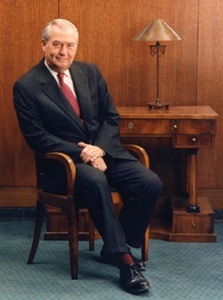
Dick photographed in the North Point Building lobby circa 1990.
10. He still comes into the office every day from approximately 6:30 a.m. to 4 p.m. at the age of 95.
As anyone who worked with Dick when he was partner will attest, he was legendary for his 12-to-18-hour workdays. He works far fewer hours now, devoting his time to helping nonprofit organizations such as the Cleveland Ballet and Cleveland Council on World Affairs.
As Dick told Crain's Cleveland Business in 2019, upon making its list of "Eight Over 80": "The nonprofit world it's like drinking an ocean. You could spend your whole life doing it because there's so much need."
—Written by Julie A. Evans, Jones Day


